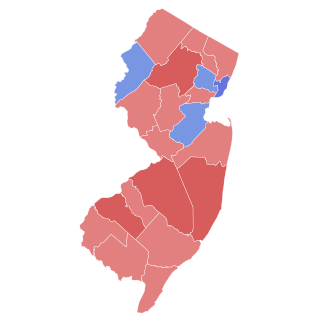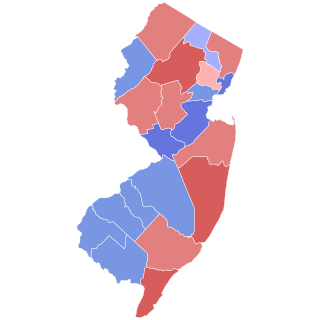
Edward Irving Edwards was an American attorney, banker, and Democratic Party politician who served as the 37th Governor of New Jersey from 1920 to 1923 and represented the state in the United States Senate from 1923 to 1929. He was a leading critic of Prohibition.

Robert Winthrop Kean was an American Republican Party politician from the state of New Jersey. Kean represented parts of Essex County, New Jersey in the United States House of Representatives from 1939 to 1959. He retired from the House to run for United States Senate in 1958, but was defeated by Harrison A. Williams.

Hamilton Fish Kean was a U.S. Senator from New Jersey.

A general election was held in the U.S. state of New Jersey on November 3, 2009. Primary elections were held on June 2. Most state positions were up in this election cycle, which includes all 80 seats in the New Jersey General Assembly, as well as Governor and Lieutenant Governor. In addition to the State Legislative elections, numerous county offices and freeholders in addition to municipal offices were up for election. There was one statewide ballot question. Some counties and municipalities may have had local ballot questions as well. Non-partisan local elections, some school board elections, and some fire district elections also happened throughout the year.

The 2002 United States Senate election in New Jersey was held on November 5, 2002. Former U.S. senator Frank Lautenberg was elected to an open seat over Republican businessman Doug Forrester after incumbent senator Robert Torricelli dropped out of the race on September 30, facing ethical misconduct allegations, a formal admonishment by the U.S. Senate, and falling poll numbers against Forrester.

The 1970 United States Senate election in New Jersey was held on November 3, 1970. Incumbent Democrat Harrison A. Williams defeated Republican nominee Nelson G. Gross with 54.02% of the vote.

The 1973 New Jersey Senate elections were held on November 6. The result of the elections were large gains for the Democratic Party, which won control of the Senate. The party picked up twelve seats. This election marked the first time since 1967 that Democrats controlled the State Senate.

The 1985 New Jersey gubernatorial election was held on November 5, 1985. Incumbent Republican Governor Thomas Kean won a landslide re-election against the Democratic candidate, Essex County Executive Peter Shapiro. As of 2025, Kean's is the largest margin in terms of percentage and raw votes in all New Jersey gubernatorial elections. Kean was the first Republican to be re-elected governor since 1949, and the first Republican to ever win two four-year terms.

The 1981 New Jersey gubernatorial election was held November 3, 1981. Republican Speaker of the New Jersey General Assembly Thomas Kean narrowly defeated Democratic U.S. Representative James Florio, 49.46%-49.38, following a recount. Kean's margin of victory was 1,797 votes out of more than two million votes cast. As of 2025, the 1981 gubernatorial election remains the closest gubernatorial contest in New Jersey history.

The 1937 New Jersey gubernatorial election was held on November 2, 1937. Democratic nominee A. Harry Moore defeated Republican nominee Lester H. Clee with 50.84% of the vote.

The 1934 New Jersey gubernatorial election was held on November 6, 1934. Republican nominee Harold G. Hoffman narrowly defeated Democratic nominee William L. Dill with 49.90% of the vote.

The 1934 United States Senate election in New York was held on November 6, 1934, to elect a U.S. Senator. Incumbent Democratic Senator Royal Copeland was re-elected to a third term in office, though he would die in office in 1938.

The United States Senate election of 1922 in New Jersey was held on November 7, 1922.

The 1924 United States Senate election in New Jersey was held on November 4, 1924. Incumbent Republican Senator Walter Evans Edge was re-elected to a second term in office. He would not complete the term, resigning from office in 1929 to be sworn in as the U.S. Ambassador to France.

The United States Senate election of 1928 in New Jersey was held on November 6, 1928. Incumbent Democratic Senator Edward I. Edwards ran for re-election to a second term in office, but was defeated by Hamilton Fish Kean in a landslide. This was the third of four straight elections to this seat in which the incumbents were defeated.

The United States Senate elections of 1936 in New Jersey was held on November 3, 1936.

The 1958 United States Senate election in New Jersey was held on November 4, 1958.

The 1981 New Jersey Senate elections were held on November 3. The New Jersey legislature reapportioned its state legislative districts in advance of the 1981 election. The new districts resulted in many senators running for re-election in newly re-numbered districts. The election coincided with a tightly contested gubernatorial election between Thomas Kean and James Florio. Republicans gained five seats, narrowing the Democratic majority to 22–18.

The 1991 New Jersey Senate election was held on November 5. The election took place mid-way through the term of Governor James Florio. The results were a landslide victory for the Republican Party amidst a tax revolt by New Jersey voters. Democrats picked up only one seat, that of Senator Lee B. Laskin. Republicans picked up eleven Democrat seats, winning control of the Senate for the first time since 1974. This was the first election after the 1990 census.
The 1963 New Jersey Senate elections were held on November 5.





















